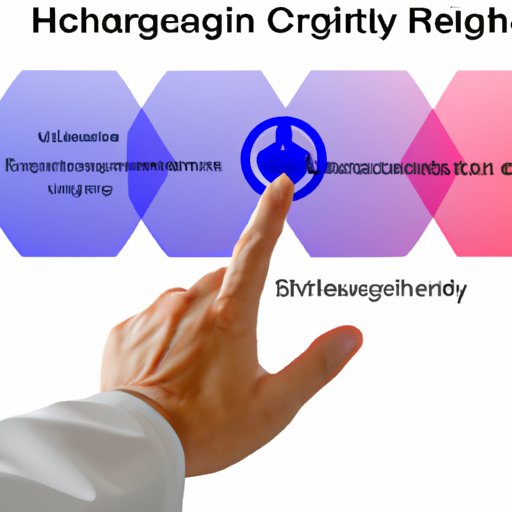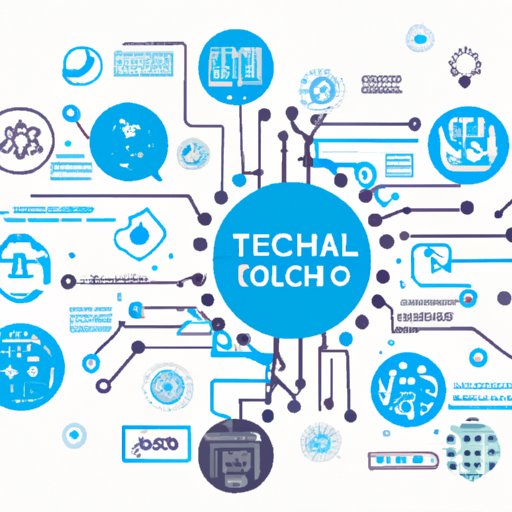Introduction
The healthcare sector is rapidly evolving with the introduction of innovative technologies. As new technologies are adopted, ethical decision making in healthcare has become increasingly complex. Ethical decision making involves considering the moral values and principles that guide healthcare professionals in their practice. It requires careful consideration of the risks, benefits, and consequences associated with decisions that impact patients and other stakeholders. In this article, we will explore how technology has been influencing ethical decision making in healthcare.

Analyzing the Impact of Technology on Ethical Decision Making in Healthcare
Technology has had a profound impact on ethical decision making in healthcare. Advancements in artificial intelligence (AI), big data, and automation have enabled healthcare organizations to make more informed and ethical decisions. In addition, the rise of online education and the emergence of wearable technologies and blockchain have further complicated the ethical considerations for healthcare professionals.
Exploring the Role of Artificial Intelligence in Ethical Decision Making in Healthcare
AI has emerged as a powerful tool for improving healthcare decision-making. AI systems can analyze large amounts of data quickly and accurately, enabling healthcare providers to make more informed and ethical decisions. For example, AI can be used to identify patterns in patient data that may be indicative of an underlying medical condition. AI can also be used to automate certain processes, such as scheduling appointments or ordering tests, which can help to reduce errors and improve patient outcomes.
However, AI is not without its challenges. AI systems can be biased if they are not properly trained or if the data used to train them is biased. This can lead to decisions that are not based on ethical considerations. Additionally, there are concerns about privacy and security when using AI systems. As such, it is important for healthcare organizations to consider these issues when developing and implementing AI solutions.

Examining the Use of Big Data to Improve Ethical Decision Making in Healthcare
Big data has the potential to revolutionize healthcare decision making. By collecting and analyzing vast amounts of data from multiple sources, healthcare organizations can gain valuable insights into the health of their patients and the effectiveness of their treatments. This information can then be used to make more informed and ethical decisions. For example, big data can be used to identify potential trends in patient health, allowing healthcare professionals to intervene earlier and prevent potential complications.
However, there are potential barriers to the effective use of big data in healthcare. One of the biggest challenges is ensuring that data is collected and analyzed ethically. Additionally, there are concerns about privacy and security when handling sensitive patient data. As such, it is important for healthcare organizations to ensure that their data collection and analysis practices adhere to all relevant laws and regulations.

Investigating the Benefits and Drawbacks of Automation for Ethical Decision Making in Healthcare
Automation can be a useful tool for improving healthcare decision making. Automating certain processes, such as appointment scheduling or test ordering, can help to reduce errors and improve patient outcomes. Additionally, automating certain tasks can free up healthcare professionals to focus on more complex tasks that require greater judgment and ethical consideration.
However, there are some drawbacks to automation. Automated systems can be unreliable if they are not properly designed or implemented. Additionally, some tasks may require a level of human judgment that cannot be replicated by automated systems. As such, it is important for healthcare organizations to carefully consider the risks and benefits of automation before implementing any automated solutions.

Examining the Potential of Online Education Platforms for Improving Ethical Decision Making in Healthcare
Online education platforms have become increasingly popular in healthcare as a way to provide training and education to healthcare professionals. These platforms are designed to provide interactive learning experiences that can help healthcare professionals develop their skills and knowledge. By providing timely and relevant information, these platforms can help healthcare professionals make more informed and ethical decisions.
However, it is important to note that online education platforms can present some challenges. For example, it can be difficult to ensure that all learners are receiving the same quality of instruction. Additionally, online education platforms may not provide the same level of interaction and feedback as more traditional forms of training. As such, it is important for healthcare organizations to evaluate online education platforms carefully before adopting them.
Evaluating the Potential of Wearable Technologies for Enhancing Ethical Decision Making in Healthcare
Wearable technologies, such as fitness trackers and smartwatches, have the potential to revolutionize healthcare decision making. By providing real-time data about a patient’s health, these devices can help healthcare professionals make more informed and ethical decisions. For example, a fitness tracker can provide data about a patient’s activity levels and heart rate, which can help healthcare professionals identify potential health problems earlier.
However, there are some concerns about the use of wearable technologies in healthcare. For example, there are questions about the accuracy and reliability of the data collected by these devices. Additionally, there are concerns about how this data is secured and protected. As such, it is important for healthcare organizations to carefully consider the risks and benefits of wearable technologies before adopting them.
Discussing the Implications of Blockchain for Ethical Decision Making in Healthcare
Blockchain technology has the potential to revolutionize healthcare decision making. By securely storing and sharing data across a distributed network, blockchain technology can help ensure that data is protected and authenticated. This can be especially helpful in situations where multiple stakeholders need to access and share patient data. In addition, blockchain technology can help to reduce the cost and complexity of healthcare data management, which can help to improve patient outcomes.
However, there are some limitations to the use of blockchain technology in healthcare. For example, blockchain technology is still relatively new, and there are questions about its scalability and security. Additionally, there are concerns about the potential for blockchain technology to enable unethical decision making, such as through the manipulation of data or the exploitation of vulnerable populations. As such, it is important for healthcare organizations to carefully consider the risks and benefits of blockchain technology before adopting it.
Conclusion
Technology has had a significant impact on ethical decision making in healthcare. Advancements in artificial intelligence, big data, and automation have enabled healthcare organizations to make more informed and ethical decisions. In addition, the emergence of online education, wearable technologies, and blockchain have further complicated the ethical considerations for healthcare professionals. It is important for healthcare organizations to carefully consider the risks and benefits of these technologies before adopting them.
In summary, technology has had a profound impact on ethical decision making in healthcare. While the potential benefits of these technologies are substantial, it is important for healthcare organizations to be aware of the risks and challenges associated with them. With the proper safeguards in place, these technologies can help to improve healthcare decision making and patient outcomes.
Recommendations for Future Research
As technology continues to evolve, it is important for researchers to continue to explore the impact of technology on ethical decision making in healthcare. Further research is needed to understand the potential risks and benefits of these technologies, as well as to identify strategies for mitigating any potential risks. Additionally, research should focus on exploring how technology can be used to support healthcare professionals in making more informed and ethical decisions.
(Note: Is this article not meeting your expectations? Do you have knowledge or insights to share? Unlock new opportunities and expand your reach by joining our authors team. Click Registration to join us and share your expertise with our readers.)
